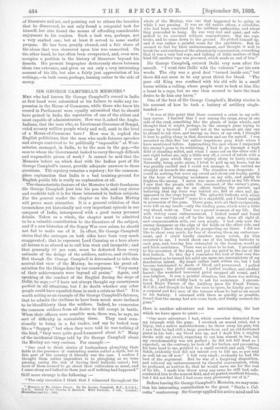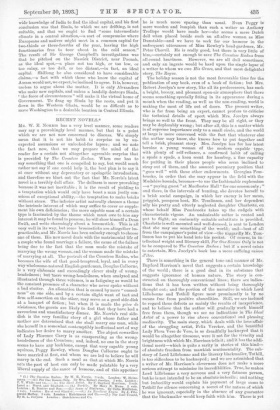SIR GEORGE CAMPBELL'S MEMOIRS.* MEN who had known Sir George
Campbell's record in India at first hand were astonished at his failure to make any im- pression in the House of Commons, while those who knew his record in Parliament were equally astonished that he should have gained in India the reputation of one of the ablest and most capable of administrators. How was it, asked the Anglo- Indians, that the man who, as Lieutenant-Governor of Bengal, ruled seventy million people wisely and well, sank to the level of a House-of-Commons bore P How was it, replied the English politicians, that the man who made fatuous speeches and always contrived to be politically " impossible " at West- minster, managed, in India, to be the man in the gap,—the manta whom the Government looked to carry through difficult and responsible pieces of work ? It cannot be said that the Memoirs before us, which deal with the Indian part of Sir George Campbell's career, provide adequate answers to these questions. The mystery remains a mystery; for the common- place explanation that India is a bad training-ground for English public life is really no explanation at all.
The characteristic feature of the Memoirs is their frankness. Sir George Campbell just lets his pen talk, and very clever and readable talk it is for those interested in Indian subjects.
For the general reader the chapter on the Indian Mutiny will prove most attractive. It is a general criticism of that tremendous yet historically not very important episode in our conquest of India, interspersed with a good many personal details. Taken as a whole, the chapter must be admitted to be a valuable contribution to the literature of the subject, and if a new historian of the Sepoy War ever arises, he should not fail to make use of it. In effect, Sir George Campbell states that the outrages on both sides have been very much exaggerated ; that to represent Lord Canning as a hero above all heroes is as absurd as to call him weak and incapable ; and that generally liO per cent. must be deducted from every estimate of the doings of the soldiers, natives, and civilians. But though Sir George Campbell is determined to take this neutral-tint view of the Mutiny, he expresses his great ad- miration for the things done by our countrymen. "Very many of their achievements were beyond all praise." Again, and speaking of the conduct of the English during the siege of Delhi, he says :—" I have not always thought my countrymen perfect in all situations, but I do doubt whether any other people could have equalled them in such a crisis as that." It is worth noting as an example of Sir George Campbell's fairness, that he admits the civilians to have been much more inclined to be bloodthirsty than the soldiers. Indeed, he exonerates the common soldiers from all desire to kill except in battle. When their officers were sensible men, there was, he says, no eort of difficulty in restraining them. They used occa- clonally to bring in a fat trader, and say he looked very like a." Saypoy ;" but when they were told he was nothing of the kind, " they were quite good-humoured about it." Many of the incidental things told by Sir George Campbell about the Mutiny are very curious. For example One used to think stories of husbandman ploughing their fields in the presence of contending armies rather a myth, but in this part of the country it literally was the case. I confess I thought them rather imprudent to be ploughing as we were passing, seeing the risk of having their bullocks seized ; but most of them seemed to go about their cultivation as usual, and I came along and talked to them just as if nothing had happened."
Still more strange is the following :— " The only execution I think that I witnessed throughout the
Memoirs of My Indian Career. By Sir George Campbell, M.P., ID,C.L. Edited by Sir Charles E. Bernard. With Portrait, 2 vole, London: Macmillan and Co. 1822.
whole of the Mutiny, was one that happened to be going on while I was passing. It was an old native officer, a subahdar, who had been convicted by the military authorities, and whom they proceeded to hang. He was very cool and quiet, and sub- mitted to be executed without remonstrance. But the rope broke, and he came down to the ground. He picked himself up, and it was rather a painful scene for the spectators. But he seemed to feel for their embarrassment, and thought it well to break the awkwardness of the situation by conversation, remarking that it was a very bad rope, and talking of little matters of that kind till another rope was procured, which made an end of him."
Sir George Campbell, entered Delhi very soon after the assault. "I went into Delhi with the vultures" are his own words. The city was a good deal "turned inside out," but there did not seem to be any great thirst for blood. "The poor old King was confined with his old wife in a small house within a railing, where people went to look at him like a beast in a cage, but no one then seemed to have the least desire to do him any harm."
One of the best of Sir George Campbell's Mutiny stories is his account of how he took a battery of artillery single- handed :— "It was at this point that there occurred a crisis in my mili- tary career. I fancied that I saw among the crops, away at one side of the road, something like the gleam of large wheels, and thought that it might, perhaps, be the enemy's guns trying to escape by a by-road. I could not at the moment get any one to attend to my view, and having no force of my own, I thought it best to gallop along in that direction and see for myself. I was mounted on that fine but rather impetuous gray Arab whom I have mentioned before. Approaching the spot where I suspected the enemy's guns to be retreating, I had to go through a high field of standing millet, and when I came out on the other side I saw right before me, only a little way off, a crowd of rebels with a train of gum which they were urging along in hasty retreat. Naturally, being quite alone, I tried to pull up my horse, but he was greatly excited and I could not manage it. He carried me straight on towards the enemy. The situation was desperate. I could do nothing but wave my sword and shout out loudly, partly in the hope of bringing assistance on my side, and partly to frighten the enemy. I never was more relieved in thy life when I saw that the people with the rearmost of the enemy's guns, evidently taking me for an officer leading the pursuit, and believing that my force was behind me, fled at once and dis- appeared in the crops beyond. The splendid bullocks with which the guns were " horsed ' came to a standstill, and I found myself in possession of the guns. Three guns, with all their equipments, were left on my hands—only the leading guns, which were a little way ahead, went on. That was a proud moment of my life. But with victory came embarrassment. I looked round and found that I was entirely cut off by the high crops from all sight of, and communication with, our own people. I had only seen the enemy disappear on the edge of the fields on the other side, and for aught I knew they might be prospecting me there. I did not like to shout very much, for fear of showing them my embarrass- ment, and I could hardly simulate many voices. An idea occurred to me. I would shoot one of the leading bullocks in each gun, and, leaving him entangled in the harness, would go and fetch assistance. There was no time to be Iost. I proceeded to the execution of the plan, and put my pistol to the ear of the first bullock. To this &.y I remember the look of that very fine quadruped as he turned his mild eye upon me, unempiciaus of my murderous intent. My heart rather sank within me, but I had become habituated to deeds of blood, and persevered. I pulled the trigger : the pistol snapped. I pulled another, and another barrel : the wretched borrowed pistol snapped all round, and I was helpless. It was a painful situation, but there was nothing for it. I galloped wildly back to ask for assistance. I encoun- tered Major Turner of the Artillery (now Sir Frank Turner, K.C.B.), and though he had few men to spare, he kindly gave me a corporal and five men of the lancers whom he had as an escort to his battery. I returned with them as quickly as possible, found that the enemy had not come back, and finally secured the guns."
Here is another adventure not less entertaining, the last which we have space to quote :— "One more adventure I had, which somewhat detracted from my triumph with the guns. I overtook an armed rebel, not a Sepoy, but a native matchlockman ; he threw away his gun, but I saw that he had still a large powder-horn and an old-fashioned pistol in his belt ; my blood was up, and I dealt him a mighty stroke with my sword, expecting to cut him almost in two, but my swordsmanship was not perfect ; he did not fall dead as I expected; on the contrary, he took off his turban, and presenting his bare head to me, pointed to a small scratch and said, 'There, Sahib, evidently God did not intend you to kill me, so you may as well let me off now.' I felt very small ; evidently he had the beat of the argument. But he was of a forgiving disposition, and relieved my embarrassment by cheerful conversation, while he professed, as natives do, that he would serve me for the rest of his life. I made him throw away any arms he still had, safe- conducted him to the nearest field, and we parted excellent friends; but I did not feel that I had come very gloriously out of it."
Before leaving Sir George Campbell's Memoirs, we maymen- tion. his interesting contribution to the great "Simla v. Cal- outta," controversy. Sir George applied his active mind and his wide knowledge of India to find the ideal capital, and his first conclusion was that Simla, to which we are drifting, is not suitable, and that we ought to find "some intermediate climate in a central situation,—a sort of compromise where Europeans and natives might meet in a common capital for two-thirds or three-fourths of the year, leaving the high functionaries free to tour about in the cold season." The result of Sir George Campbell's investigations was that he pitched on the Nassick District, near Poonah, as the ideal spot,—a place not too high, or too low, or too rainy, or too dull, or too distant,—in fact, an ideal capital. Shillong he also considered to have considerable claims,—a fact with which those who know the capital of Assam would not, we expect, be inclined to agree. It is, however, useless to argue about the matter. It is only Alexanders who make new capitals, and unless a landslip destroys Simla, the force of circumstances" will make it the virtual home of Government. To drag up Simla by the roots, and put it down in the Western Ghats, would be as difficult as to move Washington to a desirable location in Central Illinois.



































 Previous page
Previous page